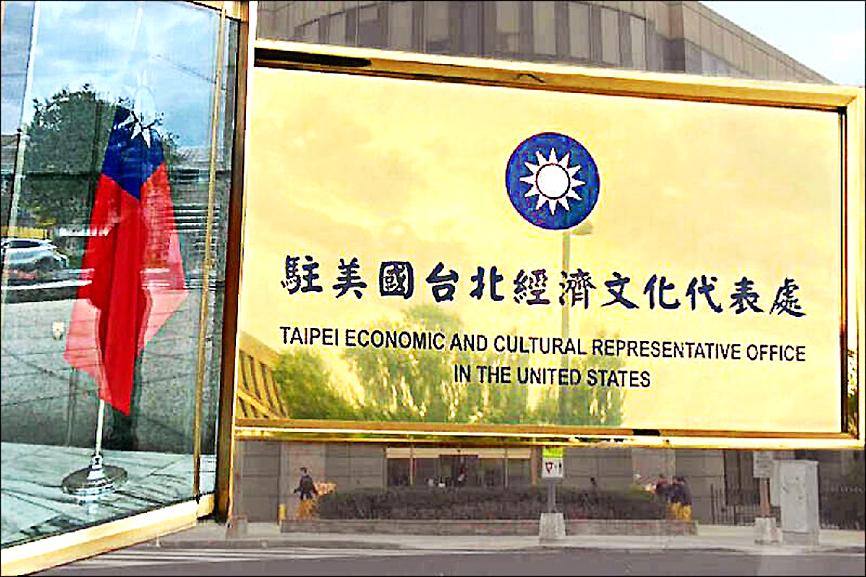A bipartisan group of US lawmakers on Thursday proposed matching bills in the US Senate and US House of Representatives that would require the US to negotiate the renaming of Taiwan’s de facto embassy in Washington as the “Taiwan Representative Office.”
The mission is currently called the Taipei Economic and Cultural Representative Office (TECRO).
Should the measures become law, any change in the office’s name could provide cover to smaller countries to take similar steps to boost engagement with Taiwan.

Photo: Lu Yi-hsuan, Tapei Times
It might also create a new rift in US-China relations, which are at their lowest point in decades, as Washington is seeking to push back against what it sees as Beijing’s growing economic and military coercion.
The US does not have official ties with Taiwan, but is its biggest international backer.
The bills would direct the US Secretary of State to “seek to enter into negotiations” with TECRO to rename its office as the “Taiwan Representative Office.”
US Senate Foreign Relations Committee Chairman Bob Menendez and US Senator Marco Rubio sponsored the Senate bill, with US representatives John Curtis and Chris Pappas leading on the House version.
“The US must make clear that, despite all efforts by the Chinese Communist Party to intimidate and coerce Taiwan, hostile powers have no right to claim sovereignty over democratic countries,” Rubio said.
Menendez told reporters that the bills were consistent with the US’ Taiwan Relations Act, which defines Washington’s unofficial ties with Taiwan, and demonstrate its support for the nation “to determine its own future.”
“We must take this step to strengthen our diplomatic partnership with Taiwan and counter China’s repeated attempts to threaten and coerce nations around the globe,” Pappas said.
In Taipei, the Ministry of Foreign Affairs yesterday expressed gratitude to the US Congress for its bipartisan support and the enhancement of Taiwan-US relations.
The White House, the US Department of State and China’s embassy in Washington did not respond immediately to requests for comment.
China downgraded its diplomatic relations with Lithuania and pressed multinationals to sever ties with the country after Taipei last year opened an office in Vilnius, bearing the name “Taiwan.”
Beijing calls Taiwan’s status the most sensitive issue in China-US relations and the basis for ties between the two superpowers.
Additional reporting by Aaron Tu, staff reporter

INVESTIGATION: The case is the latest instance of a DPP figure being implicated in an espionage network accused of allegedly leaking information to Chinese intelligence Democratic Progressive Party (DPP) member Ho Jen-chieh (何仁傑) was detained and held incommunicado yesterday on suspicion of spying for China during his tenure as assistant to then-minister of foreign affairs Joseph Wu (吳釗燮). The Taipei District Prosecutors’ Office said Ho was implicated during its investigation into alleged spying activities by former Presidential Office consultant Wu Shang-yu (吳尚雨). Prosecutors said there is reason to believe Ho breached the National Security Act (國家安全法) by leaking classified Ministry of Foreign Affairs information to Chinese intelligence. Following interrogation, prosecutors petitioned the Taipei District Court to detain Ho, citing concerns over potential collusion or tampering of evidence. The

‘FORM OF PROTEST’: The German Institute Taipei said it was ‘shocked’ to see Nazi symbolism used in connection with political aims as it condemned the incident Sung Chien-liang (宋建樑), who led efforts to recall Democratic Progressive Party (DPP) Legislator Lee Kun-cheng (李坤城), was released on bail of NT$80,000 yesterday amid an outcry over a Nazi armband he wore to questioning the night before. Sung arrived at the New Taipei City District Prosecutors’ Office for questioning in a recall petition forgery case on Tuesday night wearing a red armband bearing a swastika, carrying a copy of Adolf Hitler’s Mein Kampf and giving a Nazi salute. Sung left the building at 1:15am without the armband and apparently covering the book with a coat. This is a serious international scandal and Chinese

Seventy percent of middle and elementary schools now conduct English classes entirely in English, the Ministry of Education said, as it encourages schools nationwide to adopt this practice Minister of Education (MOE) Cheng Ying-yao (鄭英耀) is scheduled to present a report on the government’s bilingual education policy to the Legislative Yuan’s Education and Culture Committee today. The report would outline strategies aimed at expanding access to education, reducing regional disparities and improving talent cultivation. Implementation of bilingual education policies has varied across local governments, occasionally drawing public criticism. For example, some schools have required teachers of non-English subjects to pass English proficiency

TRADE: The premier pledged safeguards on ‘Made in Taiwan’ labeling, anti-dumping measures and stricter export controls to strengthen its position in trade talks Products labeled “made in Taiwan” must be genuinely made in Taiwan, Premier Cho Jung-tai (卓榮泰) said yesterday, vowing to enforce strict safeguards against “origin laundering” and initiate anti-dumping investigations to prevent China dumping its products in Taiwan. Cho made the remarks in a discussion session with representatives from industries in Kaohsiung. In response to the US government’s recent announcement of “reciprocal” tariffs on its trading partners, President William Lai (賴清德) and Cho last week began a series of consultations with industry leaders nationwide to gather feedback and address concerns. Taiwanese and US officials held a videoconference on Friday evening to discuss the